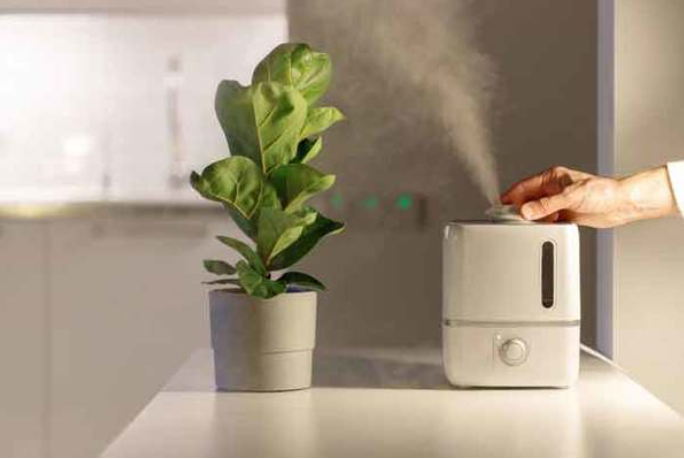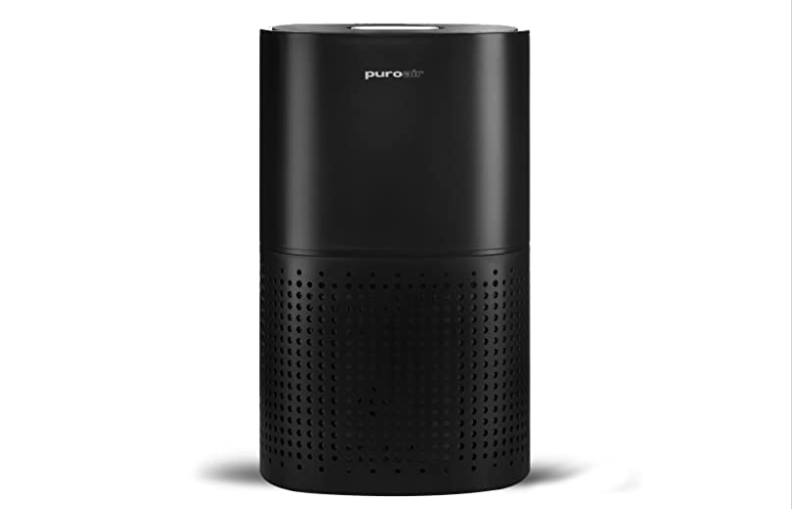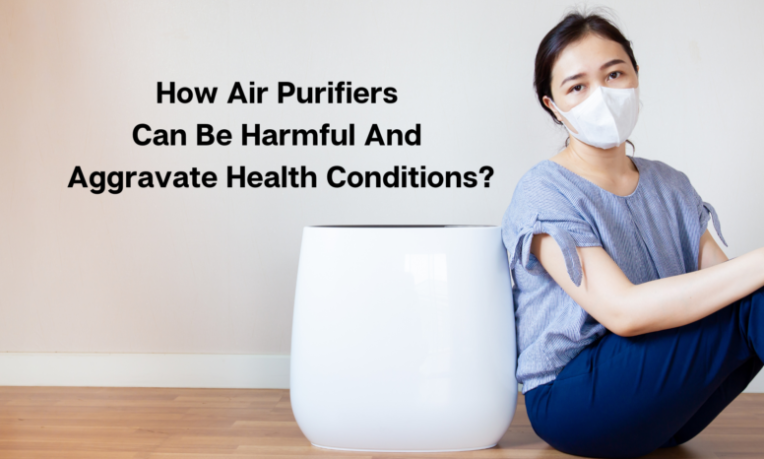Whether it’s dust, smoke, or odor, air purifiers have considered one of the most excellent methods to cut it. Are they, but, as safe and healthy as they appear? What you can do about how air purifiers can be harmful and aggravate health conditions. Headaches, coughing, asthma attacks, or allergies have all been linked to air purifiers!
What Are the Functions of Air Purifiers?
One or more filters, or even a fan, is included in air purifiers. The fan (or a system of internal fans) draws in air, which then passes through the filters on the inside. Filters trap pollutants such as dust and pollen and disperse clean air back into the room. Indoor air circulation is maintained thanks to this filtration process.

Air Purifier Types
While most air purifiers have HEPA filters. Some have activated carbon or UV light filters. A combination of two or three types of filters in advanced air purifiers. We’ll go over the kind of air purifiers and also how they work in this section:
1-HEPA Filters
HEPA filters in air purifiers can capture pollutants as small as 0.3 microns. The naked eye cannot see these microscopic particles. We can see the tiniest particles, at least 50 or 60 microns in diameter.
2-Carbon Activated
Activated carbon filters in air purifiers trap odors. They are incapable of capturing viruses and bacteria in the same way that HEPA filters are.
3- Electrostatic Precipitators
Electrostatic precipitators in air purifiers use high voltage. Electrical energy charges particles passing through the filters. The pathogens that have died continue to accumulate on the electrostatic plates. Electrostatic plates must change to keep the filter’s efficiency, increasing maintenance costs. Electrostatic precipitators also produce ozone, a reactive gas that can cause lung damage.
4- Air Purifiers That Use Ultraviolet Light
UV rays are used in these air purifiers to kill germs in the air. Few UV light air cleaners produce ozone. So, before you buy anything, double-check..
5- Generators of Ozone
Air purifiers absorb odors with ozone generators. Because higher ozone is released by these air purifiers. It renders the room unfit for the use for the next 24 hours. They are commonly used in hotels. Even low levels of ozone exposure can result in chest pain, coughing, and shortness of breath. Extended exposure damages the lungs.
How Air Purifiers Can Be Harmful and Aggravate Health Conditions

Although air purifiers boost air efficiency and yield breathing problems. New research suggests that they may be harmful to your health if used in certain situations. You should know how air purifiers can be harmful and aggravate health conditions. Air purifiers can exacerbate your symptoms, so use them sparingly, if at all.
Before purchasing an air purifier, one should know the potential disadvantages of this.
Is it possible that using an air purifier in your home will cause you more harm than good? Do the dangers outweigh the advantages?
Fortunately, we’ve outlined the potential dangers of using an air purifier below!
1- By Releasing Noxious Ozone
The use of ozone in air purifiers is the first thing to consider.
1.1 Ozone Air Purifier
We all heard about the ozone layer. How does it absorb harmful Uv radiation that causes skin cancer, but why is it in our air purifiers?
Ozone can find on the ground, and in the air, we breathe.
Because ozone is such a reactive gas. It may react with molecules in our respiratory system. Causing health problems that you should think about before buying.
Because they purify the air by producing ozone. These air purifiers are recognized as ozone generators.
This ozone needs to react with the mold and mildew that has contaminated your home. This will be promoted by manufacturers as a selling point. But they will often fail to mention that inhaled ozone can be harmful rather than beneficial.
1.2 What Are The Consequences Of Inhaling Ozone?
Inhaling ozone produced by your purifier has the following effects:
- Coughing
- Inflammation of the throat
- Breathing problems
If you or someone you live with has a respiratory disease. Inhaling ozone will exacerbate your symptoms to a dangerous level.
You should avoid all these things. So why do some companies continue to sell ozone-producing air purifiers to consumers? Because there are ozone levels that are safe to consume!
The CDCP has a guideline for using ozone purification. But it ultimately discourages residential use.
It only allows artificially produced ozone into your home. If done by an expert ozone purification company. And only when necessary, such as when you can’t stand the smell in your house!
Studies show that ozone power stations are ineffective at preventing bacteria growth.
But, turning on an ozone generator may make your home smell cleaner.
In reality, the ozone generator smell is only masking other unpleasant odors.
Cross ozone air purifiers off your list when shopping for an air purifier for your home; they might not be worth it! They are not only ineffective at eliminating the sources of odor in your home. But they also endanger your health in the following ways:
- Inhaling ozone can make your asthma worse.
- Ozone has the potential to irritate the lungs.
- They may because you to become out of breath.
- Air purifiers have the prospect to swell your airways.
2- Allowing Pollutants to Build Up
Now that ozone air purifiers are no longer an option. Another type of air purifier that consumers are frequently confused with is atmospheric generators.
2.1 What Are Ionic Air Purifiers and How Do They Work?
Ionizers are also known as ionic air purifiers. Release ions–negatively charged particles–into the air.
These ionizer particles bind to the positively charged particles in your home’s pollutants.
It causes the pollutants to fall to the ground or stick to various substrates in your homes. Such as your walls, t.v, sofa, or even your bed!
Did you know that ions in the air can improve your mood besides clearing your air of tiny particles? According to a study on negatively charged particles, ions can act as antidepressants. Particularly for those suffering from mood disorders. So keep that in mind when shopping for an ionizer.
So, we ask the fundamental question. Is your ionic air purifier improving your indoor air quality?
Let’s go back to how ionizers handle pollutants in your home. The negatively charged particles in allergens. Dust, mold, and other contaminants, weighing them down to the point. Where they’re too heavy to stay floating and fall to the ground, safely out of your nostrils.
2.2 What Happens To These Pollutants after That?
They do not go away, unfortunately. Locus on your home’s surfaces, waiting to be swept up later or forgotten!
If you let the dirt build up long enough, it will eventually come loose and float back up to the air you breathe in. Studies show that it must be a very powerful ionizer for an air ionizer to work and be truly effective.
So why don’t you go out and buy a “stronger ionizer”? Unfortunately, we’ll have to stop you there. Like ozone air purifiers, these industrial-grade ionizers also emit ozone. And we’ve already learned that inhaling ozone is harmful to your health.
Ionizers are also discouraged by air purifier review sites. Because, in the end, they don’t pass your house of pollutants. They merely displace them. And if you don’t clean your house regularly, those pollutants still can find their way. Into your lungs and cause damage!
So, if air ionizers and ozone generators aren’t an option, what are your other options? The answer, fortunately for you, is yes!
3- Enabling Pollutants to Pass
You’ve probably heard of air purifiers that use chemicals to “remove” pollutants. But let’s look at a more traditional approach used by air purifier manufacturers.
3.1 What Is The Purpose Of A HEPA Filter Air Purifier?
You may have heard of “HEPA” filters used in some of the most popular air purifiers. HEPA stands for high-efficiency particulate air. And it is the industry standard when it comes to air purifiers. It works by catching specks of dust, mold, fur, and other particles in your home with fragile fiber pieces.
If you buy a unit with a HEPA filter, expect to replace it. Every two to three years because debris builds up over time.
The US Department of Energy raised the standard in 1963. Requiring all HEPA purifiers to capture 99.97 percent of particulates. And as a result, all units sold since then have been used to clean the air inside homes. HEPA filters appear to be the most natural act of extracting airborne particles. But do they, like ionizers and ozone generators, conceal health risks?
3.2 Are HEPA Filters Harmful to Humans?
HEPA filters, it has been pointed out, only remove physical particulates from the air. So what about the other materials floating around in your house? Cleaning products contain VOCs (volatile organic compounds). And even beauty products, are an example of this.
3.3 What Is HEPA Filter?
They are a much smaller material than HEPA filters. To capture, so they will sometimes remain in your home if you have a HEPA air purifier.
It can be problematic because some VOCs are carcinogens that can cause cancer. Even though the chances are slim, this is a health risk you should not dismiss. Another common misconception is that HEPA filters can remove viruses from the air.
In fact, in light of recent events. We’ve heard HEPA filters can reduce the risk of COVID-19 transmission. We don’t know because research on the subject is still ongoing.
Nonetheless, it would help if you considered having a HEPA filter air purifier in your home. While its ability to prevent coronavirus transmission has yet to be proven. It may be helpful in some situations.
In 2003, as during the SARS epidemic in Hong Kong. Hospitals were advised to use HEPA filter air purifiers in inpatient wards. It reduces the risk of transmission. The Centers for Disease Control and Prevention (CDC) expressed similar sentiments.
Yet, because HEPA air purifiers don’t mask odors. And ozone generators, you might want to consider one that combines. A HEPA filter with activated carbon. It traps gases and chemicals that your HEPA filter can’t.
Products to Consider
On Amazon and other vendors, you can find a variety of air purifiers. To begin your search, consider the following options:
PuroAir HEPA 14 Air Purifier
PuroAir HEPA 14 Air Purifier

Amazon has a 4.6-star rating. Additionally, you can find air purifiers and filters. It has been certified by U.S Asthma and Allergy Foundation as asthma. And allergy-friendly devices. An allergist may also make recommendations specific to your needs and lifestyle.
Conclusion
If an air purifier isn’t working correctly or is misused, it can cause additional health problems. If suffer from allergies, or other difficulty breathing. You have to know how air purifiers can be harmful and aggravate health conditions. And how these machines can exacerbate your symptoms. It shows how to use your air purifier without exacerbating your health problems. And how to maximize its benefits.
Frequently Asked Question
Q: Are air purifiers beneficial to Covid?
A: Air purifiers, when appropriately used, can help reduce airborne contaminants. Like viruses in a residence or confined space. A portable air cleaner is insufficient to protect people from COVID-19.
Q: Can air purifiers clean out the air?
A: But, air purifiers make the air you inhale dry? Your air purifier will not dry out the air. Its purpose is not to deplete moisture in the atmosphere in the same way that a dehumidifier does. It enhances the air quality by removing contaminants. Such as dust, pollen, and dander that cause the air to become dry.
Q: Is it necessary to use air purifiers?
A: While air purifiers aren’t necessary for everyone’s home. This same truth is that they help more people than they hurt. According to studies, indoor air quality can indeed be up to 5 times worse than outdoor air.
